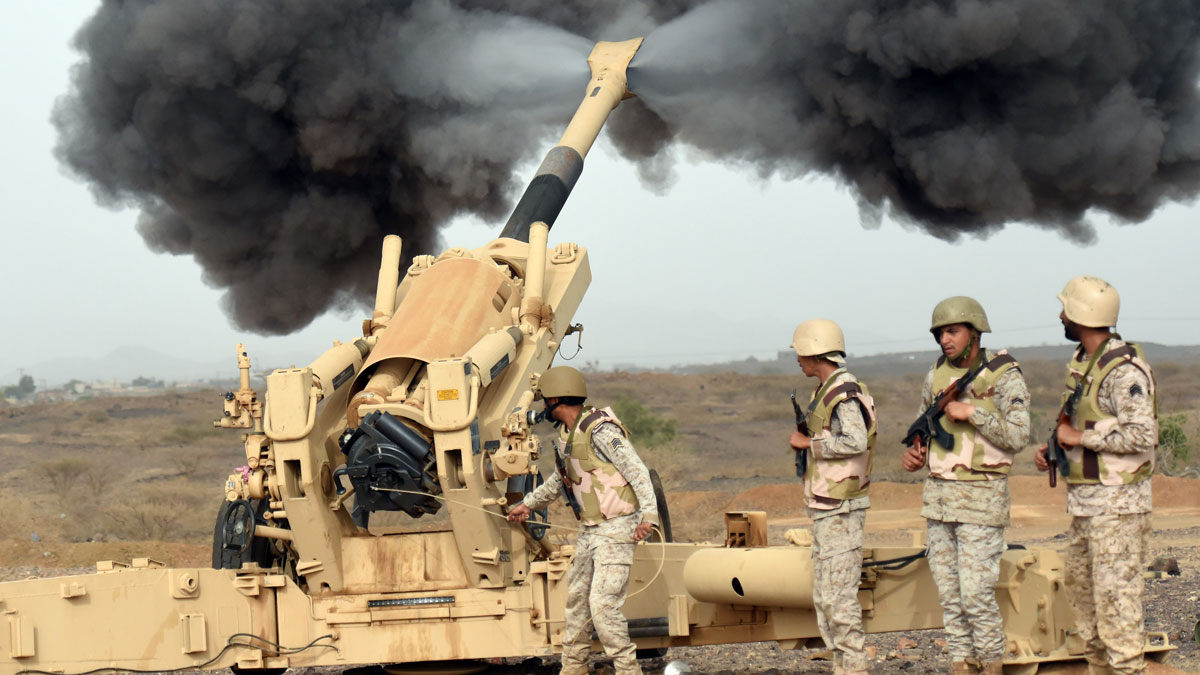What is Britain's role in Yemen?
British forces in Saudi-led coalition coming under increasing scrutiny following civilian deaths

A free daily email with the biggest news stories of the day – and the best features from TheWeek.com
You are now subscribed
Your newsletter sign-up was successful
As the civil war in Yemen continues, Britain's role in the conflict is a source of growing concern.
According to The Independent "British-supplied planes and British-made missiles have been part of near-daily air raids in Yemen carried out by a nine-country, Saudi Arabian-led coalition."
Responding to the revelations that 94 members of the UK armed forces are carrying out duties for unknown forces, believed to be the Saudi-led coalition, Jennifer Gibson, a staff attorney at the charity Reprieve, said in a statement: "This is a long way from real transparency. It is impossible to tell what operations or even what countries these personnel are active in, making this information almost worthless."
The Week
Escape your echo chamber. Get the facts behind the news, plus analysis from multiple perspectives.

Sign up for The Week's Free Newsletters
From our morning news briefing to a weekly Good News Newsletter, get the best of The Week delivered directly to your inbox.
From our morning news briefing to a weekly Good News Newsletter, get the best of The Week delivered directly to your inbox.
Gibson said the UK is entitled to use military force, but that "parliament and the public deserve to know at the very least which wars we are sending our troops into and under whose command."
What is going on in Yemen?
What was initially a domestic power struggle between Yemen's incumbent president Abd Rabbu Mansour Hadi and its predominantly Shia Houthi militia escalated as Saudi Arabia began a massive bombing campaign at the head of a nine-nation coalition, backing the government.
In the nine months since then, the war has become a struggle between the Gulf Kingdom and what it sees as an Iranian-backed Shia insurgency.
A free daily email with the biggest news stories of the day – and the best features from TheWeek.com
The UN estimates that at least 4,500 people – including 2,110 civilians – have been killed as a result of the fighting. It warns that the country is on the brink of famine, with millions of people at risk of starvation.
How is Britain involved?
With its close ties to the Saudi government through military contracts and arms deals, Britain has supplied many of the aircraft and missiles that have been used against the Houthi rebels.
According to the Independent, with the UK as the number one supplier of major weapons to the Saudi kingdom last year and scores of British-made fighter jets currently being flown by the Saudi royal air force, the country's involvement is "irrefutable". Britain exported more than 1,000 bombs to Saudi Arabia in the first six months of this year.
The Foreign Office insists it has received assurances from the coalition that the bombing campaign adheres to international law, despite the nearly 5,000 civilian casualties since it began.
Who is accountable?
Last week, a group of prominent lawyers said British arms sales to Saudi Arabia were unlawful and called for an immediate halt.
Lawyers for the Foreign Office, meanwhile, have warned that Britain could be prosecuted for war crimes if it emerges that its missiles have been used against civilians.
The government has repeatedly trumpeted the £98m in overseas aid it has sent Yemen in the current financial year, yet this pales in comparison to the estimated £1.7bn-worth of UK export licences to Saudi Arabia in the first six months of 2015.
-
 How the FCC’s ‘equal time’ rule works
How the FCC’s ‘equal time’ rule worksIn the Spotlight The law is at the heart of the Colbert-CBS conflict
-
 What is the endgame in the DHS shutdown?
What is the endgame in the DHS shutdown?Today’s Big Question Democrats want to rein in ICE’s immigration crackdown
-
 ‘Poor time management isn’t just an inconvenience’
‘Poor time management isn’t just an inconvenience’Instant Opinion Opinion, comment and editorials of the day
-
 Epstein files topple law CEO, roil UK government
Epstein files topple law CEO, roil UK governmentSpeed Read Peter Mandelson, Britain’s former ambassador to the US, is caught up in the scandal
-
 Iran and US prepare to meet after skirmishes
Iran and US prepare to meet after skirmishesSpeed Read The incident comes amid heightened tensions in the Middle East
-
 Israel retrieves final hostage’s body from Gaza
Israel retrieves final hostage’s body from GazaSpeed Read The 24-year-old police officer was killed during the initial Hamas attack
-
 China’s Xi targets top general in growing purge
China’s Xi targets top general in growing purgeSpeed Read Zhang Youxia is being investigated over ‘grave violations’ of the law
-
 Panama and Canada are negotiating over a crucial copper mine
Panama and Canada are negotiating over a crucial copper mineIn the Spotlight Panama is set to make a final decision on the mine this summer
-
 Why Greenland’s natural resources are nearly impossible to mine
Why Greenland’s natural resources are nearly impossible to mineThe Explainer The country’s natural landscape makes the task extremely difficult
-
 Iran cuts internet as protests escalate
Iran cuts internet as protests escalateSpeed Reada Government buildings across the country have been set on fire
-
 US nabs ‘shadow’ tanker claimed by Russia
US nabs ‘shadow’ tanker claimed by RussiaSpeed Read The ship was one of two vessels seized by the US military